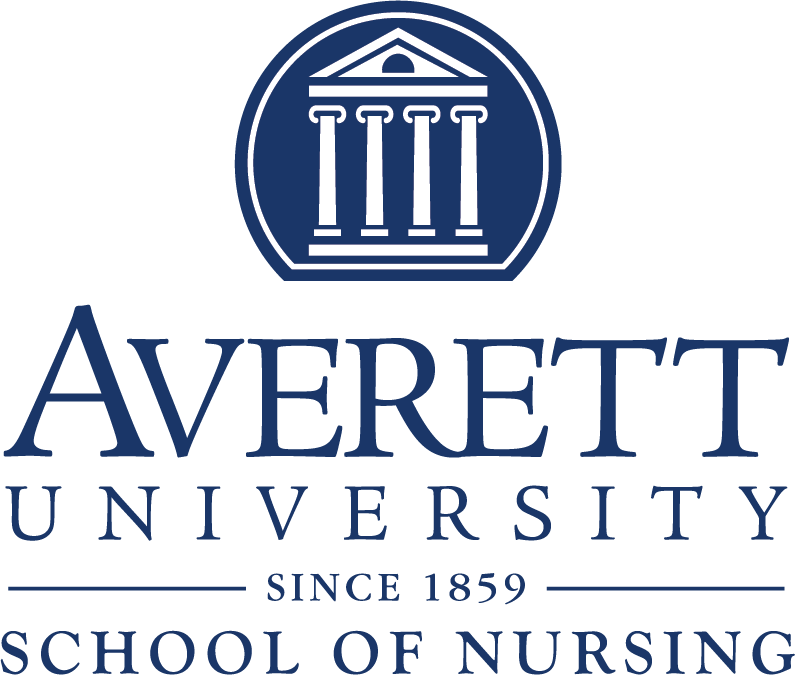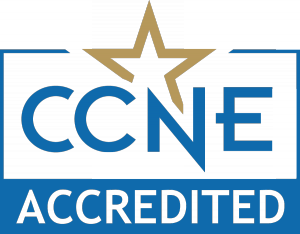
The Averett University School of Nursing recently received accreditation by the Commission on Collegiate Nursing Education (CCNE), one of the most recognized accrediting agencies in the country, ensuring the quality and integrity of baccalaureate, graduate and residency programs in nursing.
Averett’s traditional, on-campus, four-year Bachelor of Science in nursing (BSN) program was re-accredited for 10 years – the maximum number of years allowed – and this is the program’s second time to receive accreditation from CCNE.
Averett’s Master of Science in nursing (MSN) program received CCNE accreditation for five years, the maximum number of years for initial licensure for a new program, and the post-graduate advanced practiced registered nurses (APRN) certificate program received it for 10. This is the earliest these programs were eligible for accreditation since their inception in 2019.
Averett’s School of Nursing’s Interim Dean Dr. Teresa Beach said accreditation is important for several reasons.
 “For nursing schools, CCNE accreditation is a badge of honor. It signifies that a program is among the best of the best, a distinction that enables it to attract motivated, top-performing students. The CCNE board members and evaluators are all proven leaders in the fields of nursing and nursing education. Accreditation is voluntary, but by choosing to go through that process, a school demonstrates its desire to hold itself—and to be held—to the highest standards. We are thrilled that all three programs received the maximum number of years possible for each program,” Beach said.
“For nursing schools, CCNE accreditation is a badge of honor. It signifies that a program is among the best of the best, a distinction that enables it to attract motivated, top-performing students. The CCNE board members and evaluators are all proven leaders in the fields of nursing and nursing education. Accreditation is voluntary, but by choosing to go through that process, a school demonstrates its desire to hold itself—and to be held—to the highest standards. We are thrilled that all three programs received the maximum number of years possible for each program,” Beach said.
Accreditation can also be important for career goals and financial needs. Attending an accredited program enables one to:
- Receive federal financial aid: Students attending non-accredited schools may not be eligible to receive financial aid from the U.S. Department of Education.
- Transfer to schools or pursue an advanced degree: Many schools refuse to accept credits from non-accredited programs. This can influence how many classes that will need to be taken or whether the student might have to start all over from scratch, and can even limit options of school choice.
- Be competitive in the job market: Graduating from an accredited program can make a resume stand out as employers will automatically know that accredited schools provide high-quality education. Additionally, there are many employers who will only hire nurses who have graduated from accredited programs.
- Have increased choices in career options: Nurses who wish to teach should also be aware of their school’s accreditation status. Nurse educator positions and college teaching positions generally require a degree from an accredited school or program.
With the MSN and post-graduate certificate, the process of obtaining accreditation began when the program was being formulated to ensure all aspects reflected the quality indicators necessary for accreditation. Once the MSN program started in January 2020, data collection and analysis was initiated.
In both programs, Beach said accreditation is an ongoing process, which requires the entire team’s involvement.
CCNE evaluators usually perform a three-day site visit at the university to examine all of the required information and to talk to school faculty, staff, administrators, students and clinical partners. Due to COVID-19, that site visit was completed virtually.
Accreditation by CCNE serves as a statement of good educational practice in the field of nursing. This comprehensive process consists of a review and assessment of the program’s mission and governance, institutional commitment and resources, curriculum and teaching-learning practices, and assessment and achievement of program outcomes. These are the four main standards that are assessed to see if the program complies with the key elements.
“For nursing students, CCNE accreditation standards are an assurance that they can expect to receive an education of the highest quality possible, and communicates to the student that they will be equipped to enter the workforce after graduation as a fully trained, capable and confident nurse,” Beach said.
A total of 127 students have graduated from Averett’s nursing program. During the spring 2021 commencement exercises, 16 students graduated from the BSN program. Many of them entered the workforce in a wide range of specialty areas, and over 30% of those graduates will remain in the Danville area. The first cohort from the MSN program is expected to graduate in December.
It was announced earlier in the summer that Averett now offers an Accelerated Bachelor of Science in Nursing (ABSN) program in Hampton Roads, Va., a hybrid program with online and in-person requirements.
